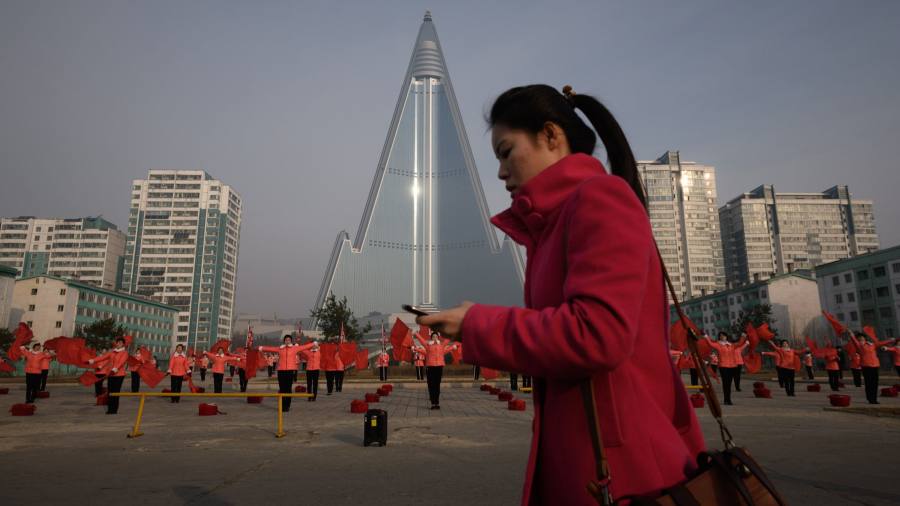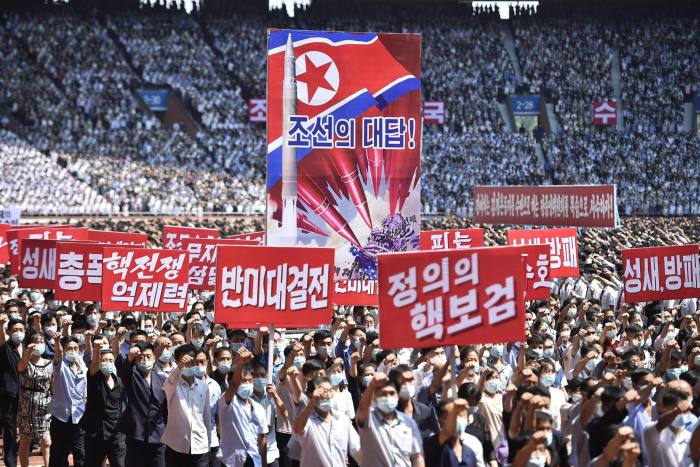
With her cut-glass English accent and love of the Harry Potter series, 11-year-old Song-a might seem just like any other well-heeled schoolgirl posting musings about her interests and daily life on YouTube.
But according to South Korea’s National Intelligence Service (NIS) the video blogger, who invites viewers to learn more about the joys of her “magnificent” hometown of Pyongyang, is actually a tool of North Korea’s “psychological warfare” operations.
Her YouTube account, which had more than 30,000 subscribers, was terminated this week, one of three removed by the platform after authorities in Seoul moved to crack down on a network of North Korean propaganda channels.
“North Korea has been running such YouTube channels as part of its psychological warfare against South Korea,” an NIS official told South Korea’s state news agency Yonhap last week. Seoul had blocked domestic access to the YouTube accounts before the Google-owned platform took action to remove them from its global platform.
North Korean propaganda is most commonly associated with the fiery rhetoric of leader Kim Jong Un, who traded insults and threats of nuclear annihilation with former US president Donald Trump, and with mass displays of military might. This week, a rally in Pyongyang included posters of a nuclear strike on the US and a giant fist crushing “the savage puppet traitor” South Korean government.
But under Kim, who assumed power in 2011, Pyongyang has also honed subtler propaganda techniques, mimicking western and South Korean media in an effort to present a more relatable image and inject more “truthfulness” into its messaging. Video channels such as Song-a’s are believed to be part of that effort.
“They want to present a ‘likeable North Korea’ to external audiences,” said Rachel Minyoung Lee, a senior analyst at the Open Nuclear Network in Vienna and an expert on North Korean state media. “The message is that North Korea is not that different, that it’s not the weird, evil country with a starving population that the west paints it as.”

Analysts have traced the accounts of Song-a, fellow vlogger “YuMi”, and several other young female presenters — who speak proficient English, Chinese and Russian as well as Korean — to the Sogwang Media Corp, a North Korean company with close links to the Kim regime.
“They understand that younger women can make the message more appealing,” said Lee, adding that elements of the videos were likely modelled on South Korean influencers.
“It is clear that the regime itself tracks developments in foreign media and social media closely so that its own content can have more impact,” Lee said. She added that Seoul’s security establishment was concerned that “certain segments of the South Korean population remain susceptible to North Korean propaganda”.
Sogwang attracted attention in 2017, when it began operating so-called sockpuppet accounts that parroted the government’s narrative on Twitter and Chinese social media platform Weibo. The company’s chief executive is the wife of North Korea’s ambassador to China, and the daughter of a former envoy to Beijing, according to Seoul-based information service NK Pro.
Song-a first appeared in 2020, as a guest on another YouTube programme, “What’s Up Pyongyang?”, which launched two years earlier on an account called Echo of Truth and was hosted by a young woman called Un A, who claimed to show viewers “real life” in the North Korean capital and to rebut “fake news”. Song-a’s own channel was launched in April 2022.
In her introductory video, Song-a promises to take viewers on a tour of Pyongyang, where “literally everywhere you go there are amusement parks”.
She also poses with a Korean-language edition of Harry Potter and the Philosopher’s Stone. A later video shows benevolent military doctors administering medicine to her family during a coronavirus lockdown.
Song-a’s videos give the impression that she is an ordinary North Korean schoolgirl who was taught English at home by her mother. But according to analysts at NK Pro, she is the daughter of a North Korean diplomat previously based in London, the granddaughter of a vice foreign minister and the great-granddaughter of a venerated Korean war-era general.
Colin Zwirko, an analyst at NK Pro who has tracked Sogwang and its affiliated social media accounts, noted that ordinary North Koreans do not have access to the internet and would have no independent means of uploading videos to social media.
“It is unclear how many layers there are between the person appearing in the video, and the person uploading the video,” said Zwirko, who added that Sogwang’s offices adjoin those of North Korea’s state Korea Central News Agency.
Google confirmed to the Financial Times that the YouTube accounts hosting Song-a and YuMi’s videos, along with a third account called “New DPRK”, had been removed.
“Google is committed to compliance with applicable US sanctions and trade compliance laws, including those related to North Korea,” the company said.
But Zwirko warned that erasing the accounts would deprive analysts of a precious resource — insight into the mundane details of life under the Kim regime.
“Every glimpse of what’s going on in Pyongyang is valuable,” he said. “It might just be things going on in the background — people’s behaviour in the street, what people are wearing, what kinds of phones people are using, what kind of Covid restrictions are in place, what kind of economic activities you can see.”
“By all means, label these videos as North Korean propaganda, but for them simply to be deleted is a terrible thing.”
Additional reporting by Hannah Murphy in San Francisco